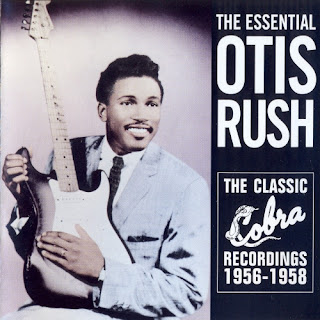V2.34
Every summer, a ton of ink is splashed around on newspaper and magazine pages hyping the season’s roving festivals. Through the past few years, Ozzfest, Lollapalooza, the Vans Warped tour and a dozen other here-today, gone-tomorrow traveling minstrel shows are featured in print articles and on TV. What a lot of folks don’t realize, however, is that dozens of annual blues festivals soldier on, unabated, year after year in locales as diverse as Maine, Washington, Pennsylvania, and especially California. These blues festivals may not get as much publicity as the national touring shows do, but they have longevity and tens of thousands of music-loving fans on their side.
On the Labor Day holiday weekend, KKJZ-FM (formerly KLON) will be sponsoring the 23rd annual Long Beach Blues Festival. The radio station, based on the campus of California State University, has been broadcasting jazz and blues programming since 1981 and has lined up a stellar roster of talent for this year’s blues festival. Saturday, August 31st will feature blues guitarists Otis Rush, Robert Cray, and Jeff Healey; soul legends Ben E. King and Arthur Adams; and R&B trailblazers the Ohio Players on the stage. Sunday, September 1st showcases the amazing Etta James, Ike Turner, and New Orleans’ favorite son Dr. John headlining the event along with Tyrone Davis, Mable John and blues axeman Roy Gaines.
As shown by the recently released compilation The Essentials (Elektra Records), Dr. John’s trademark vocal growl and inspired musical blend of R&B, jazz, blues, and rock has served him well through the years. Best known for a smattering of hits such as 1973’s “Right Place, Wrong Time” and his 1989 duet on “Makin’ Whoopee” with Rickie Lee Jones, the music of Dr. John (née Mac Rebennack) has deep roots. Rebennack got his start in the business over forty years ago as a teenage guitarist working with famed New Orleans engineer Cosimo Matassa. As a session player, the future “Night Tripper” backed such local stars as Earl King, Professor Longhair and James “Sugarboy” Crawford, whose “Iko Iko” Rebennack recorded in 1972.
This early experience shows on songs such as the soulful rave-up “(Everybody Wanna Get Rich) Rite Away,” the raucous “Tipitina” or the smoky classic “In A Sentimental Mood.” Dr. John is a flamboyant and masterful stage presence and, some say, an acquired taste. He is one of the few links to the regional soul and R&B stars of the fifties and sixties, however, and one of the few talents who can draw together such disparate strains of music into one entertaining performance.
There’s not much that can be said about Etta James that hasn’t already been said during the R&B diva’s fifty-year career. James is simply one of the most magnificent blues and soul vocalists in the genre, with a charismatic stage presence that has made her a top draw in clubs and on the festival circuit for decades. Backed by the top-notch “Roots Band” that includes guitarist Josh Sklair and keyboardist David K. Matthews, James’ new Burnin’ Down the House (Private Music) captures a strong December 2001 performance at the House of Blues in Hollywood.
James runs through a red hot and smoking set that includes such crowd favorites as the Willie Dixon classic “I Just Want To Make Love To You” and the Isaac Hayes/David Porter Stax label gem “Something’s Got A Hold On Me.” James includes some of her better-known tunes such as the 1961 R&B hit “At Last,” the 1967 Muscle Shoals classic “Tell Mama,” and the timeless ballad “I’d Rather Go Blind.” Forget about the vacuous pop divas that are dominating the radio airwaves, Etta James is the real deal, a talent of unparalleled genius capable of belting out both hard-rocking blues and mournful, passionate soul ballads. With no disrespect meant to any of the new breed R&B vocalists, fans of talents like Jill Scott or India.Arie should get a copy of Etta James’ Burnin’ Down the House and see how it’s really done.
To blues aficionados, legendary guitarist Otis Rush is considered one of the founding fathers of the “West Side” style of Chicago blues. To fans uninterested in such scholarly minutiae, Rush is simply one of the hottest guitarslingers representing the Chicago blues scene, an underrated talent suffering from his own inconsistencies and often overshadowed by giants such as Muddy Waters, Buddy Guy, and even the lesser-known six-string wizard Magic Sam. Released a couple of years ago, The Essential Otis Rush (Fuel 2000 Records) is a wonderful collection of Rush’s studio work for R&B label Cobra Records circa 1956-1958, where the young bluesman built his legacy.
Working with noted producer, songwriter and producer Willie Dixon, the guitarist ripped out such powerful blues hits as “I Can’t Quit You Baby,” “My Love Will Never Die” and “Keep On Loving Me Baby” for Cobra. The Essential Otis Rush also includes some scorching lesser tracks, though, such as the down-and-dirty “Groaning the Blues” and the big-band stompdown “Three Times A Fool.” The collection also includes alternate takes for several of the hit songs, and features such future blues and R&B legends as “Big” Walter Horton and Ike Turner sitting in on the tracks. Rush would go on to record for a number of different companies, including Chicago’s Chess and Delmark labels, but he would never equal the performances and passion poured into these tracks recorded at Eli Toscano’s low-rent Cobra Records studio. One of the last surviving legends of the fabled fifties Chicago blues era, Otis Rush continues to amaze audiences with his distinctive guitar style and powerful vocals…catch him live while you can!
(View From The Hill, September 2002)




No comments:
Post a Comment